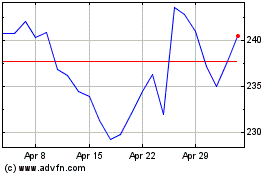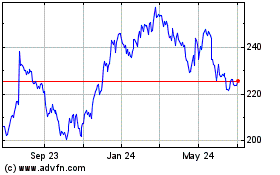By Paul Ziobro
Railroads are getting more efficient, and their customers are
paying for it.
Large railroads such as Norfolk Southern Corp. and Union Pacific
Corp. are moving quickly to streamline their operations, switching
to fewer, longer trains that run on tighter schedules.
But shippers ranging from pasta giant Barilla America Inc. to
small lumber distributors say they are having problems keeping up
with the new timetable, causing late fees to accrue and cut into
profits.
At issue is how quickly shippers return railcars back to service
after unloading or loading cargo.
Railroads are giving customers only 24 hours to return empty
railcars -- half the grace period they used to give -- and after
that are charging a "demurrage" fee of $150 a day. The previous
48-hour window allowed shippers to earn credits by returning cars
early, and then use the credits to offset fees when they had to
hold onto a car for weekends or holidays.
The new rules were implemented earlier this year at Norfolk
Southern, which operates in the eastern U.S., and at Union Pacific,
which operates west of the Mississippi River. The largest U.S.
railroads generated more than $1.4 billion in such charges in 2018
and are on pace to exceed that this year, according to data they
submitted to the Surface Transportation Board, freight railroads'
regulator.
Some shippers say there are often no quick adjustments they can
make to their industrial operations, which can involve expensive
upgrades and long construction, to meet the tighter delivery
window.
Barilla last November completed a $9.3 million upgrade at its
Ames, Iowa, plant, where it processes durum wheat into semolina.
The upgrade enables the pasta maker to accept shipments of 110 cars
at a time and unload them within 48 hours, thus avoiding additional
fees based on the old rules in effect at the time. The project was
done at the behest of and with approval from Union Pacific, a
Barilla executive said in testimony submitted to the STB for a
hearing on the new fees last week.
Barilla decided against spending an additional $1.2 million for
larger unloading pits that would have allowed even faster
turnaround, according to the testimony. Then, shortly after the
expansion was finished, Union Pacific announced it would soon
change its policy to require cars be returned in 24 hours.
In addition to deeper pits and upgraded wheat elevators and
conveyors, Barilla says it will need to renegotiate a contract with
the company that unloads its trains. Barilla, which is closely
held, didn't disclose how many fees it has amassed but is
challenging at least $22,100 in penalties assessed in February and
March.
Steel giant ArcelorMittal said longer trains make it harder to
unload trains fast enough at sites like its blast furnace in East
Chicago, Ind. "We have constraints that in many cases take capital
to improve, and we cannot just simply load or unload faster," Pete
Georgeon, a general manager for ArcelorMittal's U.S. arm, wrote in
testimony.
The railroads say the fees help shippers too.
"Our demurrage and accessorial program is designed to make sure
we keep our network fluid, which benefits all of our customers and
the entire supply chain," said Kenny Rocker, Union Pacific's
executive vice president of marketing. A company spokeswoman said
the railroad is evaluating customer feedback on the new rules and
fees.
Alan Shaw, Norfolk Southern's chief marketing officer, said the
railroad is incorporating customers' concerns "into our constant
evaluation of the reasonableness and efficacy of our demurrage and
accessorial programs."
Following the week's hearing, STB Chairman Ann Begeman said the
board is considering changes to how the fees are applied. "None of
us were convinced that the status quo is acceptable," she said.
Railroads have been under pressure from investors to speed up
operations in the U.S. ever since CSX Corp. started implementing
its turnaround plan in 2017, using the so-called precision
scheduled railroading strategy developed by the late railroad
executive Hunter Harrison.
Last year, Norfolk Southern, Union Pacific and Kansas City
Southern, which operates a railroad that extends into Mexico, began
adopting variations of the strategy, aiming to cut costs and get
more use out of assets like railcars and locomotives.
Some smaller shippers said the fees were wiping out all of their
profits and costing them customers. Harry Shea said his lumber
distributor, Shea BrothersLumber Handling Inc. in Delanco, N.J.,
hadn't accumulated any significant demurrage fees over the past
three decades. Last year, the company was hit with about $115,000
in fees by CSX and $33,000 by Norfolk Southern, erasing its
profit.
Mr. Shea said the company unloads lumber shipments as fast as it
always has, emptying nine railcars a day, but a quirk in the
handoff from the railroad to his facility often means he starts
paying a fee before he even gets the railcar.
"We were hoping that the railroads would come to their senses
and realize that it was just not doable to pay these amounts," Mr.
Shea said.
A CSX spokesman said the railroad is offering Shea Brothers
credits to offset fees when they are deemed unfair. Broadly, CSX
expects the fees it collects from shippers to decline over time as
they get used to the new operating schedule, Arthur Adams, the
company's vice president of sales, has told the STB.
Mr. Shea said his company has started to offset the fees, which
hit nearly $54,000 in the first quarter of 2019, by charging its
customers $225 per car starting in February. But that caused its
third-largest customer to sever the relationship. "Our customers
are not happy," he said.
Write to Paul Ziobro at Paul.Ziobro@wsj.com
(END) Dow Jones Newswires
May 29, 2019 08:47 ET (12:47 GMT)
Copyright (c) 2019 Dow Jones & Company, Inc.
Union Pacific (NYSE:UNP)
Historical Stock Chart
From Mar 2024 to Apr 2024

Union Pacific (NYSE:UNP)
Historical Stock Chart
From Apr 2023 to Apr 2024
